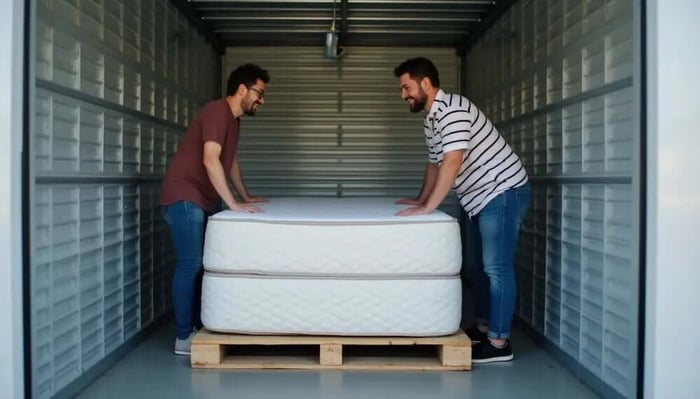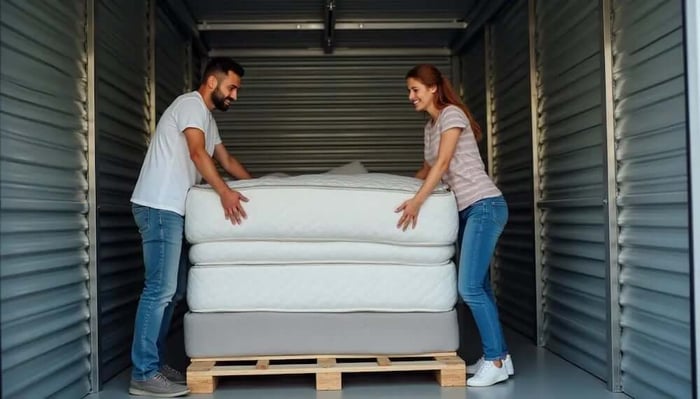Table of Contents
Storing a mattress is not as simple as moving it out of the way - you actually need to know how to store a mattress! Improper storage can lead to severe damage, including sagging, mildew, or deformation. Taking the time to store your mattress correctly will help protect your investment.
In this guide, we’ll walk you through everything you need to know, from cleaning and packing to selecting the proper storage unit and providing long-term care tips. If you follow these steps, your mattress will stay fresh, clean, and ready for when you need it next.
How to Store a Mattress: The Best Methods
Cleaning Your Mattress
Before storing your mattress, it’s essential to give it a thorough cleaning to help preserve its condition and prevent odors, stains, or mold from developing during storage.
Start by vacuuming the entire surface with a clean upholstery attachment to remove dust, hair, and debris. Next, sprinkle baking soda over the mattress and let it sit for at least 15 minutes to absorb odors. After this time, vacuum again.
To spot-clean any additional stains, use a mild upholstery cleaner or a mixture of water and gentle dish soap. Be careful not to oversaturate the fabric. Allow the mattress to dry completely before wrapping it in a breathable or waterproof cover. Storing a clean, dry mattress is the best way to ensure it remains fresh and ready for use when needed again.
Purchase Mattress Storage Essentials
While you can store your mattress uncovered, it is not recommended. Consider purchasing one of the following:
Breathable Mattress Cover: These fabric-based, water-resistant covers will prevent mold and mildew. They're great for humid climates
Plastic Mattress Bag: Heavy-duty plastic covers are puncture-proof and sealable, protecting your mattress from dirt, dust, and moisture
Vacuum-Seal Bag: If you're storing a small mattress for the short term, these bags will compress your mattress and help you save space. They're not suitable for long-term storage, though, as they can compromise the shape and quality of your mattress
Zippered Encasement: These covers offer full protection and are considered bed-bug proof, waterproof, and highly durable
You may also need to purchase additional packing essentials.
Moving blankets provide extra padding and protection when stacking mattresses
Pallets will keep your mattress elevated off the ground. This is great to prevent contact with moisture and pests.
Keep moisture absorbers on hand when storing your mattress in a storage unit, garage, or attic. They're great for controlling humidity. You can choose desiccants such as DampRid or silica gel.
Moving straps can help you lift and position your mattress. If you have a bad back or difficulty lifting heavy objects, straps are a must!
If you’re unable to purchase these items for proper storage, you can use a plastic sheet as a DIY mattress protector. But, do not just wrap in plastic alone. This can trap moisture, causing mildew.
Renting a Storage Unit
Mattresses can occupy a significant amount of extra space in your home, space that could be better utilized for other purposes. Renting a storage space will help clear your home of clutter. When renting a storage unit for a mattress, you should consider:
Unit Size: Select a unit size based on the size of the mattress you’re storing, and what other furniture you’ll be storing with it! (bedroom sets, bed frames, box springs). Take a look at our handy guide that matches standard mattress sizes with our recommendations for storage unit size:
| Mattress Size | Recommended Storage Unit Size | Why this Size? |
| Twin | 5x5 or 5x10 | Will fit standing up or flat. A 5x10 will provide extra room for bedding, small items, and boxes |
| Full | 5x10 | Can lay flat or stand upright |
| Queen | 5x10 or 10x10 | Requires more space, especially when storing a box spring or bed frame |
| King | 10x10 or larger | Can lay flat if needed. Will have extra space for other bedroom furniture, boxes, and accessories |
| California King | 10x10 or larger | Longest standard mattress and recommended to store flat, so a larger unit will be necessary |
The type of unit you’ll need: You will want to decide whether to rent a drive-up, standard unit, or a climate-controlled unit. For short-term storage in a mild climate location, a drive-up storage unit may be the preferred option. It’s typically more affordable and easier to access. For long-term storage or areas with temperature extremes and humidity, we recommend climate control.
Month-to-month lease flexibility: Unsure of how long you’ll need to store your mattress? Choose a self-storage facility with month-to-month lease terms (like Storage Star!).
Storing Your Mattress
Once you’ve secured your storage space, it's time to load it. Here are a few quick tips to store your mattress so it's ready to go when you need it:
Store your mattress flat or vertically on its side. If possible, always store it flat so it maintains its shape
Cover it with a breathable mattress cover or whatever other mattress storage essentials you previously purchased
Do not place heavy objects on top of your mattress. This could distort its shape
Elevate it off the floor using a pallet, tarp, or platform
Place moisture absorbers in the unit or storage space. Consider using natural pest repellents, too, such as lavender sachets or cedar
Check your mattress periodically to ensure it's still in great condition!
Different types of mattresses require different storage methods. When storing mattresses, be sure to consider the type of mattress you have.
| Mattress Type | Storage Position | Other Considerations |
| Innerspring Mattress | Flat or on its side | Avoid bending or folding |
| Memory Foam Mattress | Flat only | Foam will bend or warp if stored on its side. Use a breathable, waterproof cover |
| Latex Foam Mattress | Flat only | Sensitive to heat & pressure. Store in climate control and elevate off the ground with a pallet |
| Foam & Coil Mattress | Flat only | Elevate off the ground with a pallet and use a cover |
| Pillow-Top Mattress | Flat preferred | Extra padding may compress if it's stored upright. Keep covered and do not place heavy items on top |
| Roll-Up Mattress | Flat (if opened) | If sealed, keep it in its original packaging. If it's open, store it like you would a memory foam mattress. Store open roll-up mattress in climate control |
How to Store a Mattress Long Term: Climate-Control Only
While it’s highly recommended to rent climate-controlled storage for storing a mattress, it's essential to do so when storing it for an extended period. Climate control matters for mattresses because it will:
Prevent moisture buildup: Climate control limits humidity, helping to prevent mold, mildew growth, and unwanted odor.
Protect Material: Many materials, including memory foam, latex, and pillow tops, will degrade in extreme temperatures.
Keep Pests Away: Temperature-regulated storage units are less likely to attract pests and rodents. Plus, a majority are indoors, and indoor storage units are typically more protected from critters.
If you plan to store your mattress for a short term and in a mild climate, a standard unit will be good enough. But climate control will always give you peace of mind and more protection. Mattresses can be pretty expensive, so it's best to protect your investment.
What’s Next? Renting a Storage Unit!
Now that you know how to store a mattress, are you ready to free up some extra space? Whether you’re an empty nester who needs to declutter your children’s old bedrooms, moving, or going through a renovation, Storage Star can help you out.
Our clean, secure, and climate-controlled storage units are just a click away. We offer a variety of unit sizes, along with month-to-month leases, to fit your needs. So what are you waiting for? Find a Storage Star storage location near you and give your mattress the storage it deserves.
FAQs
Can you store a mattress in a storage unit?
Yes, you can store a mattress in a self-storage unit. Depending on the length you plan to store your mattress and what type of mattress you have, you will need to determine whether to select a standard drive-up unit or climate control.
What is the best way to store a mattress?
The best way is to clean and thoroughly dry your mattress first. Then, wrap it in a breathable mattress cover (aka not plastic). Lay your mattress flat in a climate-controlled storage unit. Do not place heavy items on top, as this can cause warping.
Should I rent climate control for mattress storage?
Yes. We recommend storing a mattress in a climate-controlled storage unit to help protect against humidity and temperature changes.
Should I store my mattress flat or upright?
It's always best to store your mattress flat. This will help maintain shape and structure. If it's stored on its side, your mattress can sag and be damaged.
How do I protect my mattress in storage?
Some basic mattress storage tips to protect a mattress in storage include:
- Using a breathable mattress bag
- Elevating it off the floor using lifts or a pallet
- Storing it away from sharp or heavy objects
- Avoiding plastic storage bags
How long can a mattress be stored?
Your mattress can be stored for a few months up to a few years, as long as it's properly cleaned, wrapped, and in a climate-controlled storage unit. Periodically check your mattress for signs of mold or odor.






